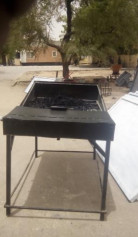THE EFFECT OF PASSIVE SINGLE SLOPE WICK TILTED TYPE SOLAR STILL IN PROMOTING PUBLIC HEALTH, THROUGH PHYSICS TECHNIQUES, IN ENERGY PHYSICS
Keywords:
distillation, wick tilted solar still, waterborne diseases, Safe drinking waterAbstract
Health as a state of complete physical, mental and social well-being and not merely the absence of disease or infirmity. Access to safe drinking water is fundamental for health and happiness, a basic human right, and a component of effective policy for health protection. Safe drinking water presents no significant risk to health over a lifetime of consumption, including groups with different sensitivities. Those at greatest risk of waterborne disease are infants and young children, people who are debilitated or living under unsanitary conditions and the elderly. Thus, the passive single slope wick-tilted type solar still is able to separate the clean-water from the highly dissolved solid matter and many other organisms. Hence, distillation process is one of the technology which is affordable, less cost effective and environmentally friendly, all of these will be achieve with the help of solar energy.
Downloads
References
Berner, E.K. & Berner, R. A. (1996). Global Environment: Water, Air and Geochemical Cycle. Prentice Hall.
Garg, H. P., & Datta, G (1993). Fundamentals and characteristics of solar radiation. Renewable Energy, 3, 305 – 319.
Sabbagh, J. A. (1977). Heat transfer for solar energy utilization. In: A. A. M Sayigh, ed. 1977. Solar Energy Engineering. New
York: Academic Press, pp. 83 – 103.
Jacob, M. (1949).Heat transfer, 1st ed. New York : John Wiley & Sons.
Howe, E. D. , & Tleimat, B. W. (1977). Fundamentals of water desalination. Chp.20 in Solar energy engineering, edited by A.
A. M. Sayigh, Academic Press, New York, pp. 431 – 454.
Wattmuf, J.H., Charters, N. W. S., & Proctor, D (1977). Solar and Wind induced coefficients for solar collectors, Complex, 2,56.
Sharma, V. B. and Mullick, S. C., 1991. Estimation of heat transfer coefficients, the upward heat flow, and evaporation in a
solar still, ASME Journal of solar engineering, 113, pp.36 – 41.
Anderson, E. E. (1983). Fundamentals of solar energy conversion. Reading. Addison – Wesley publishing company, pp. 52 –
, 193 – 195.
Belessiotis, V., Voro Poulos, E and Delyannis, E., 1995. Experimental study of a solar still for determination of the daily output
of a still: Input – output method. Desalination, 100, pp.99 – 104.
ASHRAE, (1991). ANSI/ASHRAE, standard 93: methods of testing to determine the performance of solar collectors. Atlanta:
American Society of Heating. Refrigerating and Air – Conditioning, Engineers.
Tsilingiris, P. T., 2009. Analysis of the heat and mass transfer processes in solar stills. Solar Energy, 83, pp. 420 – 431.
Bates, B.C., Z.W. Kundzewicz, S. Wu & J. P. Palutikof (Eds.) (2008). Climate Change and Water Technical Paper of the
Intergovernmental Panel on climate change, IPCC Secretariat. Geneva.
Smith, C (2001). Environmental Physics. Routledge.
Water Supply and Sanitation Collaborative Council (WSSCC)(Ed.)(2004). Resource Pack on the Water and Sanitation
Millennium Development Goals.
(WWAP) World Water Assessment Programme (2009a). The United Nations World Water Development Report 3. Water in a
changing World. Paris: UNESCO, and London: Earth Scan.

Downloads
Published
Issue
Section
License
Copyright (c) 2023 The Journals of the Nigerian Association of Mathematical Physics

This work is licensed under a Creative Commons Attribution-NonCommercial-ShareAlike 4.0 International License.




